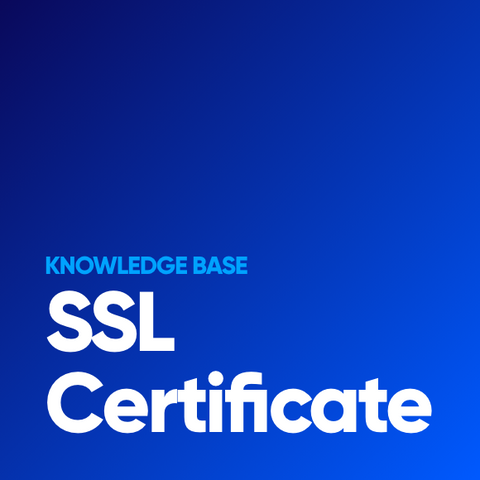SSL Certificate: Your Key to a Secure Digital Realm
In the ever-expanding digital landscape, where information flows freely and personal data is constantly in transit, the need for security has never been greater. Enter the SSL certificate, the digital guardian that ensures your online interactions are private, secure, and tamper-proof. In this dynamic realm of the internet, understanding SSL certificates and their pivotal role in data encryption is crucial for businesses and individuals.
The Shield of Data Encryption
At its core, an SSL (Secure Sockets Layer) certificate is a small but powerful data file that serves as a digital padlock. It acts as a secure bridge between a user's browser and a website's server, ensuring that all data exchanged remains confidential and integral. Here's how this digital shield works:
1. Data Encryption
When you connect to a website, an SSL certificate activates and establishes a secure connection. All data that passes between your browser and the website is encrypted. This encryption transforms the data into an unreadable format, only deciphered with the correct decryption key.
2. Authentication
SSL certificates don't just encrypt data; they also authenticate the website's identity. When you see the padlock symbol and "https://" in the website's URL, it indicates that the SSL certificate has been verified by a trusted third party, a Certificate Authority (CA). This ensures the website is legitimate and not an imposter trying to steal your data.
3. Data Integrity
Data integrity ensures that the data you send or receive isn't tampered with during transit. SSL certificates use cryptographic hash functions to verify the integrity of the data so you can trust that the information you send or receive remains unchanged.
The Many Faces of SSL Certificates
SSL certificates come in various types, each offering a specific level of validation and security. Here are the primary types you're likely to encounter:
1. Domain Validated (DV) Certificates
DV certificates are the most basic and are used to encrypt data between your browser and the website's server. They provide a padlock symbol and "https://" in the URL, indicating a secure connection. However, they don't verify the identity of the website owner.
2. Organization Validated (OV) Certificates
OV certificates offer a higher level of trust and security. In addition to encrypting data, they validate the legitimacy of the website's business or organization. This extra layer of verification is visible when you click on the padlock icon, providing information about the website owner.
3. Extended Validation (EV) Certificates
EV certificates are the gold standard of SSL security. They offer the highest level of trust and validation. Websites using EV certificates display a green address bar, indicating that they've undergone rigorous verification, making them the most trustworthy.
4. Wildcard Certificates
Wildcard certificates are designed to secure not just a single domain but multiple subdomains under it. This is particularly useful for large websites with various sections or businesses with numerous web applications.
5. Multi-Domain (SAN) Certificates
Multi-domain certificates are incredibly versatile. They allow you to secure multiple domains and subdomains under a single certificate. This is useful for businesses with various web properties.
The SSL Certificate Dance
The process of obtaining an SSL certificate involves a few steps:
1. Certificate Request
The website owner requests an SSL certificate from a Certificate Authority (CA). This request includes the website's public key, identity information, and other relevant details.
2. Verification
The CA performs verification checks to confirm the identity of the website owner. The level of verification depends on the type of certificate being requested.
3. Issuance
Once the CA is satisfied with the verification process, it issues the SSL certificate. The certificate contains the public key, the website's identity information, and the digital signature of the CA.
4. Installation
The website owner installs the SSL certificate on their server. This step involves associating the certificate with the website's domain and configuring the server to use HTTPS.
5. Ongoing Maintenance
SSL certificates have a finite lifespan, usually one to two years. Website owners need to renew their certificates to ensure uninterrupted security.
The Widespread Impact
SSL certificates are not just for e-commerce giants or big corporations; they're necessary for any website or online application. Here's why they matter to everyone:
1. Data Privacy
SSL certificates ensure that sensitive data, such as personal information, login credentials, and financial details, remains private and inaccessible to malicious actors.
2. Search Engine Ranking
Major search engines, including Google, prioritize websites with SSL certificates. Sites using HTTPS receive a slight ranking boost, making them more discoverable.
3. Trust and Credibility
Websites with SSL certificates inspire trust and confidence in users. When visitors see the padlock symbol and "https://" in the URL, they're more likely to interact with the website and share their information.
4. Legal Requirements
In some regions and industries, regulatory requirements mandate using SSL certificates, especially for websites handling sensitive information.
The SSL Landscape
As the digital world continues to evolve, the role of SSL certificates remains pivotal. They are the unsung heroes of online security, silently encrypting our data, verifying website identities, and ensuring the integrity of our online interactions.
So, whether you're a website owner, an online shopper, or just someone who values online privacy, you're not alone in this dance. SSL certificates are your trusty companions, ensuring the digital realm remains secure and private. In a world where data is king, the SSL certificate is your key to safeguarding what matters most—your digital security.

SSL Certificate





